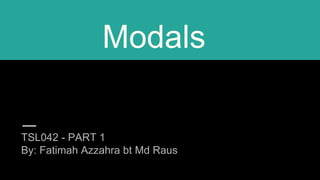
Modals part 1
- 1. Modals TSL042 - PART 1 By: Fatimah Azzahra bt Md Raus
- 2. What are modals? • Modals are auxiliary verbs that provide additional and specific meaning to the main verb of the sentence. • A modal is also used to express: ability, possibility, permission or obligation. • Modal forms: 1. Affirmative 2. Negative 3. Interrogative
- 3. Can, could, & be able to
- 4. Can, could, be able to 1) Use can, could or a form of be able to to talk about natural or learned ability. eg: She can bake very well, but she can’t cook. We could ride bikes but we couldn’t drive. Soon, you’ll be able to speak in English well.
- 5. 2) Can and could are modals. Like all modals: • They are followed by the base form of a verb. eg: Mark can rap. Not: Mark can to rap. • Have the same forms for all subjects (do not use -s for the third person). eg: I can rap, and Mark can rap too. Not: Mark cans rap.
- 6. • They form the negative with not (They do not use do). eg: She can’t rap. Not: She doesn't can rap. • They go before the subject in questions (They do not use do). eg: Can Mell rap too? Not: Does can Mell rap too?
- 7. • Be able to is an expression similar to a model, but it isn’t a real modal. • It has different forms : am, is, are, was, were, will be Eg: Was she able to rap when she was young? Will he be able to learn the salsa by Monday?
- 8. 3) Use can or sometimes am/is/are able to for present ability. a) Can is much MORE COMMON than be able to in everyday speech about present ability. eg: MORE COMMON: Can you speak Mandarin? LESS COMMON: Are you able to speak Mandarin? b) We use be able to when the ability to do something comes after a lot of HARD WORK. Eg: Mandarin was difficult for me, but now I’m able to have a conversation because I spent a year studying in Hong Kong.
- 9. 4) Use can, or will be able to for FUTURE ABILITY when you are talking about plans or arrangements. eg: I can meet you at the Hipster Cafe tomorrow. I will be able to meet you at the Hipster Cafe tomorrow. REMEMBER! Use will be able to (but NOT can) to talk about things you learn. Eg: At the end of this Asasi TESL program, you will be able to speak English well. NOT: you can speak
- 10. 5) Use could or was/were able to for past ability. Eg: Could he play drum when he was a child? Was he able to play drum when he was a child? REMEMBER! Do NOT use could in affirmative statement for a single event in the past. Use was/were able to. Eg: After a lot of hard work and dedication, they were able to win first prize in 2015 Rugby Tournament. NOT: ...they could win first prize… HOWEVER, it is possible to use couldn’t for single past event. Eg: They couldn’t win first prize in the 2015 Rugby Tournament.
- 11. Permission: Can, could, may, do you mind if
- 12. Permission 1) Can, could and may are used to ask permission. • When you use could for permission, it is not in the past. • May is much more polite than can and could. Less formal eg: Can I meet you? Could you meet me tomorrow? May I talk to you, Professor Zara? More formal
- 13. • We often say please when we ask permission. Notice the word order: Could I ask a question, please? Could I please ask a question?
- 14. 2) The expression; do you mind is used to ask permission when an action may annoy or inconvenience someone. eg: A: Do you mind if I eat some of your food? B: Yes, actually, I do. I hate sharing food with someone else. REMEMBER! Do not use please with do you mind.
- 15. Ways to answer when someone asks permission: 1) Informal expressions are used instead of modals in answer. eg: A: Could I switch off the aircond? B: Sure (or of course, or go ahead). 2) When using modal in an answer, can is almost always used. We DO NOT use could and we RARELY use may in short answer. A: Could/may I borrow your book? B: Yes, of course you can/may
- 16. REMEMBER! When the response to a question with do you mind if is: - not at all or no, I don’t = it’s okay = giving permission 3) When we refuse permission, we usually apologize and give an explanation. Eg: A: Can I come to your house tomorrow? B: I’m sorry, but my aunt from Thailand is coming tomorrow.
- 17. End of Modals: Part 1
